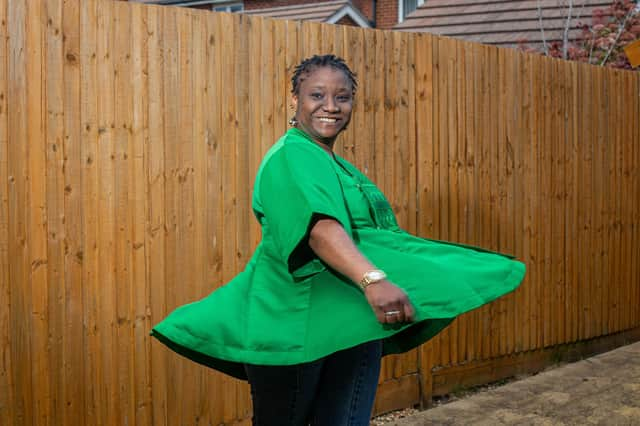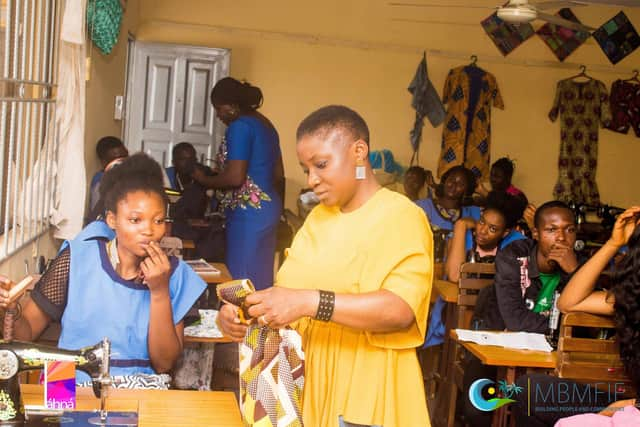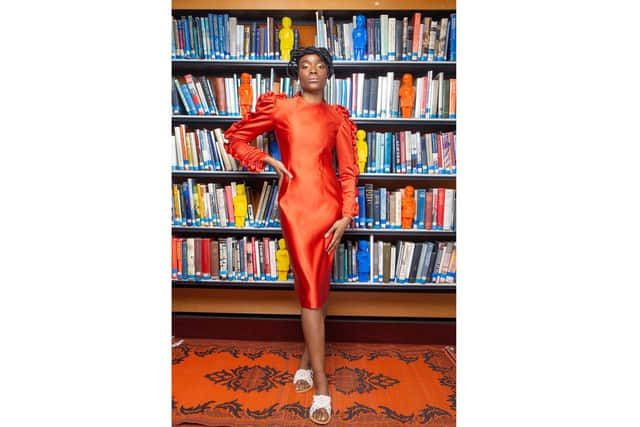Milton fashion designer celebrates African heritage through fashion


Clothes were just clothes to her.
However, years later clothes have now become her entire life.
The Milton-based fashion designer is the founder of clothing brand Semande which is inspired by her African roots and heritage. But that wasn’t always her chosen career path.


Advertisement
Hide AdAdvertisement
Hide AdShe says: ‘I first came to Portsmouth to study pharmacology in 2004. I am originally from London.
‘I was never really into fashion if I am honest.
‘When I graduated I was offered a research job at British American Tobacco in Southampton. It was in a fairly remote location so I couldn’t take it. I said I would give myself at least a year before I gave up hopes of pharmacology.
‘I started a teaching role instead and I met my future husband in Southampton.’


Soon after they were married in 2009, Yemisi was expecting their first child however she was unwell throughout her pregnancy.
Advertisement
Hide AdAdvertisement
Hide Ad‘I spent most of the nine months either at St Mary’s or Queen Alexandra Hospital,’ says Yemisi, now a mother of two.
‘I got so bored while I was there that I started thinking about other things.
‘Once I was home, I thought about taking up a new hobby. I had six months ahead of me with maternity leave and I wanted something to do.
‘I bought a sewing machine at first. My husband came home and asked what it was and I said it’s mine, I’m going to do something different.’
Advertisement
Hide AdAdvertisement
Hide AdYemisi began creating small clothing items for her children and was very proud when she made her first skirt.
‘I remember wearing it to the shops and someone said how much they loved it,’ says Yemisi, 39.
‘I was so shocked that someone liked it. She asked if I could make one for her and I said no. I wasn’t confident in my skills at all and I wouldn’t know what to do if they didn’t like it.
‘I did eventually make her a skirt and she absolutely loved it. I started to think I could make this into a business.’
Advertisement
Hide AdAdvertisement
Hide AdIn 2017, Yemisi decided to enrol on a two-year fashion diploma course at Highbury College, Cosham.
She says: ‘I really just got my head down. I think up until that point, only a double distinction existed. I managed to get a triple distinction.’
The meaning behind the name ‘Semande’ came from Yemisi’s family history. When establishing her clothing brand, it was important to her for it to have some personal and cultural significance.
‘Semande is my native name as I hail from Badagry in Nigeria. It means God has apportioned wealth to me,’ explains Yemisi.
Advertisement
Hide AdAdvertisement
Hide Ad‘Badagry was heavily involved in the slave trade. A lot of the young men when they arrived in the UK or US would adopt the name of their masters, like William for example.
‘I didn’t want to lose my native name and because my fashion celebrates African culture, I thought it was fitting to use it for my brand. It means a lot to me.’
Since Yemisi launched her first collection in 2018, the brand has evolved.
She says: ‘Semande in the past years has managed to build its brand ethos on slow ethical fashion that focuses on manufacturing premium to luxury quality ready-to-wear garments to meet the needs of the ideal woman.
Advertisement
Hide AdAdvertisement
Hide Ad‘The signature loose design silhouette is crafted so it sits beautifully on its wearer, to build confidence, universal for all occasions and cuts across multiple sizes.
‘I make all the samples myself before I send them to a factory in India. Because I know the exact measurements needed for the patterns, I order the right amount of fabric so there is no waste.
‘With the offcuts, we use up dye to change the colour or design instead of buying new fabrics.’
Alongside Semande’s ethical ethos, Yemisi works closely with a Nigerian charity which aims to empower Badagry women.
Advertisement
Hide AdAdvertisement
Hide Ad‘A percentage of the proceeds goes to a charity in my ancestral home of Badagry called My Badagry My Future International Foundation (MBMFIF), which supports with needed resources to further help with conveying the Semande message,’ explains Yemisi.
She was also invited to Badagry in 2019 to support a government initiative called WAPA by the Ministry of Women Affairs and Poverty Alleviation in Nigeria to help empower women.
This was done through setting up institutions where women can learn and develop skills like fashion, photography, textiles, catering and more in order to use the skills to set up businesses for themselves.
Yemisi says: ‘I was invited to the one in Badagry as that is the state in Nigeria where I come from and they wanted me to help shape their skills.
Advertisement
Hide AdAdvertisement
Hide Ad‘A week-long event was organised by the charity where I talked the fashion students through my fashion journey.
‘I gave them some of my African Barbie T-shirts and have kept in touch with the ladies to date to ensure they are still growing.’
Each of Yemisi’s collections are inspired by a different theme.
For the SS18 collection, the clothes were focused on the beauty of nature. In 2019, it was themed ‘osín’ – a Badagry word for water. Last year, the collection was called ‘Like play, like play’ inspired by an early 1980s’ Nigerian childhood nostalgia.
Advertisement
Hide AdAdvertisement
Hide AdYemisi adds: ‘“Like play, like play”’ is a broken English expression for ‘just like that’, which describes playfulness, humour, an element of surprise.’
The response Yemisi has received from customers exceeded her expectations and also spurred her on to create more.
‘I started getting messages from influencers and bloggers from around the world asking if they could wear my designs. I had one woman wear my clothes to Nigeria Fashion Week,’ she says.
‘I am already working on the next collection.’
What started as a hobby has transformed into a booming business, which Yemisi hopes to expand in Portsmouth.
Advertisement
Hide AdAdvertisement
Hide Ad‘In the future, I would like to have a cottage factory in Portsmouth,’ she adds.
‘I would like to be able to organise the patterns and team so they can understand the meaning behind Semande.’
‘A lot of investors in the UK are confident with the food and hospitality industry, but nervous about fashion. I hope that changes.’
For more information and to shop the most recent collection, go to semande.co.uk.